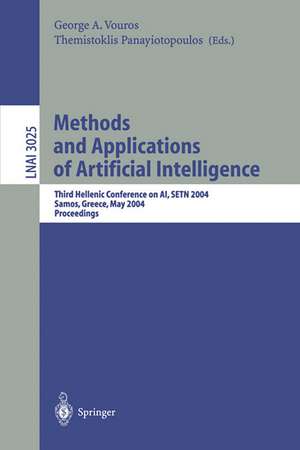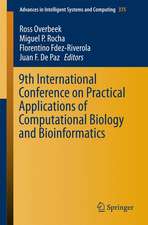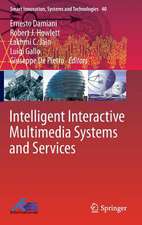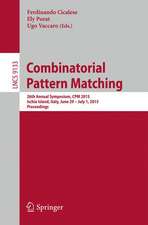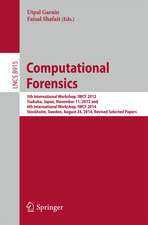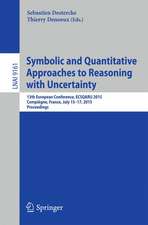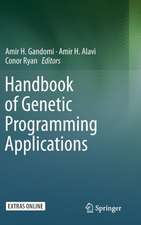Methods and Applications of Artificial Intelligence: Third Helenic Conference on AI, SETN 2004, Samos, Greece, May 5-8, 2004, Proceedings: Lecture Notes in Computer Science, cartea 3025
Editat de George A. Vouros, Themistoklis Panayiotopoulosen Limba Engleză Paperback – 22 apr 2004
Din seria Lecture Notes in Computer Science
- 20%
 Preț: 1061.55 lei
Preț: 1061.55 lei - 20%
 Preț: 307.71 lei
Preț: 307.71 lei - 20%
 Preț: 438.69 lei
Preț: 438.69 lei - 20%
 Preț: 579.30 lei
Preț: 579.30 lei -
 Preț: 410.88 lei
Preț: 410.88 lei - 17%
 Preț: 427.22 lei
Preț: 427.22 lei - 20%
 Preț: 596.46 lei
Preț: 596.46 lei - 15%
 Preț: 448.04 lei
Preț: 448.04 lei - 20%
 Preț: 353.50 lei
Preț: 353.50 lei -
 Preț: 389.49 lei
Preț: 389.49 lei - 20%
 Preț: 309.90 lei
Preț: 309.90 lei - 20%
 Preț: 645.28 lei
Preț: 645.28 lei - 20%
 Preț: 763.23 lei
Preț: 763.23 lei - 15%
 Preț: 580.46 lei
Preț: 580.46 lei - 20%
 Preț: 310.28 lei
Preț: 310.28 lei - 20%
 Preț: 655.02 lei
Preț: 655.02 lei - 20%
 Preț: 1183.14 lei
Preț: 1183.14 lei - 20%
 Preț: 340.32 lei
Preț: 340.32 lei -
 Preț: 449.57 lei
Preț: 449.57 lei - 20%
 Preț: 591.51 lei
Preț: 591.51 lei - 18%
 Preț: 938.83 lei
Preț: 938.83 lei - 20%
 Preț: 337.00 lei
Preț: 337.00 lei - 20%
 Preț: 649.50 lei
Preț: 649.50 lei - 20%
 Preț: 607.40 lei
Preț: 607.40 lei - 20%
 Preț: 1414.79 lei
Preț: 1414.79 lei - 20%
 Preț: 1024.44 lei
Preț: 1024.44 lei - 20%
 Preț: 583.40 lei
Preț: 583.40 lei - 20%
 Preț: 453.32 lei
Preț: 453.32 lei - 20%
 Preț: 575.49 lei
Preț: 575.49 lei - 20%
 Preț: 1075.26 lei
Preț: 1075.26 lei - 20%
 Preț: 585.88 lei
Preț: 585.88 lei - 20%
 Preț: 825.93 lei
Preț: 825.93 lei - 17%
 Preț: 360.20 lei
Preț: 360.20 lei - 20%
 Preț: 763.23 lei
Preț: 763.23 lei - 20%
 Preț: 340.32 lei
Preț: 340.32 lei - 20%
 Preț: 504.58 lei
Preț: 504.58 lei - 20%
 Preț: 369.13 lei
Preț: 369.13 lei - 20%
 Preț: 580.93 lei
Preț: 580.93 lei - 20%
 Preț: 343.62 lei
Preț: 343.62 lei - 20%
 Preț: 350.21 lei
Preț: 350.21 lei - 20%
 Preț: 583.40 lei
Preț: 583.40 lei - 20%
 Preț: 583.40 lei
Preț: 583.40 lei - 15%
 Preț: 438.59 lei
Preț: 438.59 lei - 20%
 Preț: 341.95 lei
Preț: 341.95 lei - 20%
 Preț: 238.01 lei
Preț: 238.01 lei - 20%
 Preț: 538.30 lei
Preț: 538.30 lei
Preț: 345.77 lei
Preț vechi: 432.21 lei
-20% Nou
Puncte Express: 519
Preț estimativ în valută:
66.18€ • 71.91$ • 55.63£
66.18€ • 71.91$ • 55.63£
Carte tipărită la comandă
Livrare economică 21 aprilie-05 mai
Preluare comenzi: 021 569.72.76
Specificații
ISBN-13: 9783540219378
ISBN-10: 3540219374
Pagini: 568
Ilustrații: XV, 546 p.
Dimensiuni: 155 x 235 x 30 mm
Greutate: 0.79 kg
Ediția:2004
Editura: Springer Berlin, Heidelberg
Colecția Springer
Seriile Lecture Notes in Computer Science, Lecture Notes in Artificial Intelligence
Locul publicării:Berlin, Heidelberg, Germany
ISBN-10: 3540219374
Pagini: 568
Ilustrații: XV, 546 p.
Dimensiuni: 155 x 235 x 30 mm
Greutate: 0.79 kg
Ediția:2004
Editura: Springer Berlin, Heidelberg
Colecția Springer
Seriile Lecture Notes in Computer Science, Lecture Notes in Artificial Intelligence
Locul publicării:Berlin, Heidelberg, Germany
Public țintă
ResearchCuprins
Invited Talks.- Constraint Satisfaction, Complexity, and Logic.- Dynamic Discovery, Invocation and Composition of Semantic Web Services.- Information Management.- Data Brokers: Building Collections through Automated Negotiation.- P2P-DIET: Ad-hoc and Continuous Queries in Peer-to-Peer Networks Using Mobile Agents.- Taxonomy-Based Annotation of XML Documents: Application to eLearning Resources.- Precise Photo Retrieval on the Web with a Fuzzy Logic\Neural Network-Based Meta-search Engine.- Intelligent Web Prefetching Based upon User Profiles – The WebNaut Case.- An Intelligent System for Aerial Image Retrieval and Classification.- Computationally Intelligent Methods for Mining 3D Medical Images.- Text Area Identification in Web Images.- A Mixed Reality Learning Environment for Geometry Education.- A Multi-criteria Protocol for Multi-agent Negotiations.- Clustering XML Documents by Structure.- Machine Learning.- Music Performer Verification Based on Learning Ensembles.- Using the k-Nearest Problems for Adaptive Multicriteria Planning.- Focused Crawling Using Temporal Difference-Learning.- A Meta-classifier Approach for Medical Diagnosis.- Learning In-between Concept Descriptions Using Iterative Induction.- Splitting Data in Decision Trees Using the New False-Positives Criterion.- Efficient Training Algorithms for the Probabilistic RBF Network.- Using k-Nearest Neighbor and Feature Selection as an Improvement to Hierarchical Clustering.- Feature Deforming for Improved Similarity-Based Learning.- Incremental Mixture Learning for Clustering Discrete Data.- A Cost Sensitive Technique for Ordinal Classification Problems.- Pap-Smear Classification Using Efficient Second Order Neural Network Training Algorithms.- Towards an Imitation System for Learning Robots.- Data Miningand Diagnosis.- Gene Selection via Discretized Gene-Expression Profiles and Greedy Feature-Elimination.- Automatic Detection of Abnormal Tissue in Bilateral Mammograms Using Neural Networks.- Feature Selection for Robust Detection of Distributed Denial-of-Service Attacks Using Genetic Algorithms.- An Intelligent Tool for Bio-magnetic Signal Processing.- Knowledge Representation and Search.- Hierarchical Bayesian Networks: An Approach to Classification and Learning for Structured Data.- Fuzzy Automata for Fault Diagnosis: A Syntactic Analysis Approach.- A Discussion of Some Intuitions of Defeasible Reasoning.- Knowledge Representation Using a Modified Earley’s Algorithm.- Fuzzy Causal Maps in Business Modeling and Performance-Driven Process Re-engineering.- Construction and Repair: A Hybrid Approach to Search in CSPs.- Arc Consistency in Binary Encodings of Non-binary CSPs: Theoretical and Experimental Evaluation.- Inherent Choice in the Search Space of Constraint Satisfaction Problem Instances.- Natural Language Processing.- Part-of-Speech Tagging in Molecular Biology Scientific Abstracts Using Morphological and Contextual Statistical Information.- A Name-Matching Algorithm for Supporting Ontology Enrichment.- Text Normalization for the Pronunciation of Non-standard Words in an Inflected Language.- Multi-topic Information Filtering with a Single User Profile.- Exploiting Cross-Document Relations for Multi-document Evolving Summarization.- Invited Session: AI in Power System Operation and Fault Diagnosis.- Diagnosing Transformer Faults with Petri Nets.- Short-Term Load Forecasting Using Radial Basis Function Networks.- Reinforcement Learning (RL) to Optimal Reconfiguration of Radial Distribution System (RDS).- A Multi-agent System for Microgrids.- Invited Session:Intelligent Techniques in Image Processing.- Automated Medical Image Registration Using the Simulated Annealing Algorithm.- Adaptive Rule-Based Facial Expression Recognition.- Locating Text in Historical Collection Manuscripts.- Semi-automatic Extraction of Semantics from Football Video Sequences.- Invited Session: Intelligent Virtual Environments.- Agents and Affect: Why Embodied Agents Need Affective Systems.- Synthetic Characters with Emotional States.- Control and Autonomy for Intelligent Virtual Agent Behaviour.- Reflex Movements for a Virtual Human: A Biology Inspired Approach.- Integrating miniMin-HSP Agents in a Dynamic Simulation Framework.
Caracteristici
Includes supplementary material: sn.pub/extras
